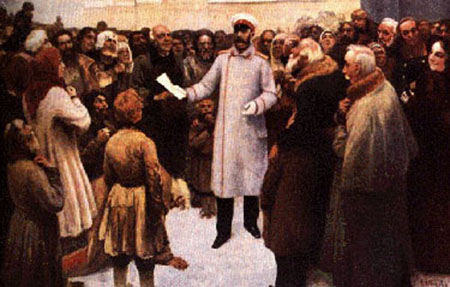The Germans Fall out of Favor

1861 - Alexander II Frees the Serfs
There were two main reasons for inviting the Germans into Russia. One was to occupy newly acquired territory and the other was to introduce German industriousness to Russia. Catherine the Great hoped Germans would serve as role models to help modernize the country. By all accounts, the German immigrants did secure the territory and established successful communities in Russia.
But problems arose because the vast majority of Russian citizens were serfs. Unlike the Germans, serfs could not own land and were under the thumb of land-owning nobles. What is the point of being more productive if all the benefits of your extra efforts went to your overlord?
After suffering defeat in the Crimean War with the British, it became painfully obvious that Russia was lagging well behind its western European neighbors. Czar Alexander II saw his place in history as the Russian ruler who would modernize and liberalize Russia, and freeing the serfs became part of that vision. In 1861 Alexander II abolished serfdom by decree.
While serfdom was not technically slavery, a serf who was born on the landlord’s property was bound to that lord and could not leave. Unfortunately, when serfdom was abolished, the terms of the emancipation were dictated by the nobility and were quite naturally always in the favor of the lord. The serfs were now free but had no land -- or, if they were lucky, had a small portion of marginal land. In either case, they were invariably in heavy debt to the lord.
The freed Ukrainian serfs looked upon the Germans with their good land, special privileges and relative prosperity with resentment. And the nobility saw this effort to westernize Russia as a threat to their power.
Articles began to appear suggesting that citizens of German descent who did not speak Russian or did not follow the Orthodox faith should be considered foreigners. Instead of being role models for a new Russia, as envisioned by Catherine the Great and Alexander I, Germans immigrants now symbolized everything that was wrong with Russia.
With resentment growing toward the Germans, there was a push to rescind their special status -- most notably the exemption from military service.
Falling out of Favor

